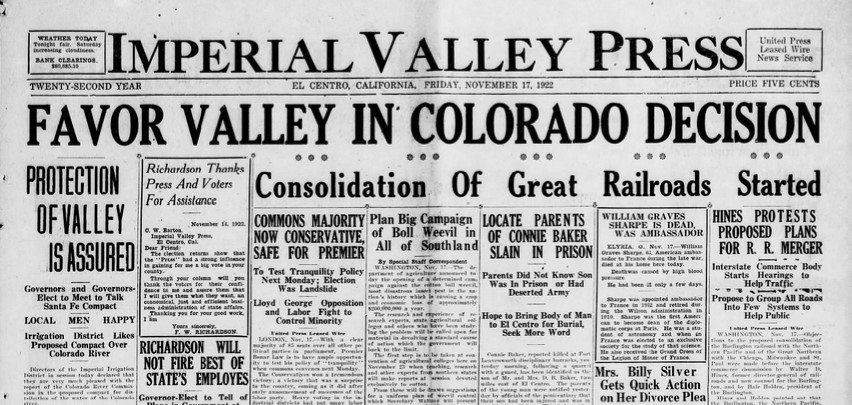
Enthusiasm in Imperial
By John Fleck and Eric Kuhn
The world outside of Bishop’s Lodge in New Mexico got its first glimpse of the nascent Colorado River Compact on in the days following the Nov. 16, 1922, meeting as Commerce Secretary Herbert Hoover briefed reporters on the barest details of what was transpiring behind closed doors.
For the first time, folks back home in the seven Colorado River Basin states saw the emergence of the idea of an “upper division” – Utah, Colorado, Wyoming, and New Mexico – and a “lower division” – Arizona, Nevada, and California.
“Definite allotment of an equal amount of the waters of the river was agreed upon between the two divisions,” wire stories out of Santa Fe reported, “and provision was made for the summoning of a second commission some years hence for the equitable division of the unallotted water, in light f the then increasing knowledge and increasing need.”
“Preference in rights for the use of water is to be established to agriculture,” reporters were told, “and none of the existing rights in the basin are disturbed.”
Enthusiasm in Imperial
For the Imperial Valley, vulnerable to flooding in the river’s southern reaches, the news was good. “The commission agreed upon the extreme agency for immediate erection of control work to protect the Imperial Valley from floods,” the wire dispatches continued.
The reaction in Imperial Valley was immediate.
“Protection of Valley is Assured”, the Imperial Valley Press headlined.
In Arizona, a lack of enthusiasm
But in addition to enthusiasm, there were warnings of the struggles to come.
“I wish to warn California right now,” Arizona Governor-elected George W.P. Hunt said in a telegram to the Arizona Republic, “and you can make it as strong as horse-radish that has just been ground, that while I am governor I am going to stick up for Arizona’s rights.”
Arizona, Hunt said, should be entitled to half of the Colorado River’s flow. “The center of the river is a state line,” Hunt said. “The center of the river is where the rights of one state cease and those of the other begin.”
The seeds of decades of conflict between Arizona and the other states of the basin were being sown, even as the Compact’s final drafting was not complete.

Again, another great blog post. George Wiley Post Hunt was a true one-issue candidate. The saying was “Jesus may have walked on the water, but George W.P. Hunt runs on the Colorado.”